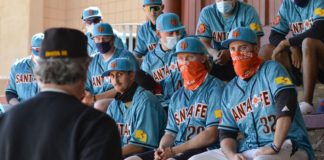
This Pride season, if you asked me what it’s like to be queer and disabled, I’d say, like Dickens in “A Tale of Two Cities,” that it’s “the best of times” and the “worst of times.”
In the mid-1970s in Cambridge, Mass., white cane in hand, I first walked into a gay bar. When I came near, people moved away. I wondered if I was the only blind lesbian, not only in the country, but in history going back to Sappho.
Many were ill at ease with queerness and disability then. One morning, a librarian wondered what I was doing “out alone” when I entered a Boston library.
On another day, a straight, blind friend and I went to an outdoor Boston Pops performance. “We shouldn’t sit too close together,” she said, “people might think we’re lesbians.”
Over the decades, disabled queer people have increasingly felt Pride in themselves, though the disabled community has often not welcomed queer people and the LGBTQ community has frequently excluded people with disabilities.
In the 2010s, I pitched a disability lifestyle magazine on doing a story on transgender people with disabilities. The editor nixed my idea, because, he said, trans, disabled people were just a “fringe group.”
Today, things are changing. I’ve found my tribe in the Deaf/disabled/queer community. Recently, we’ve been having a moment!
From actor and producer Nyle DiMarco’s new memoir “Deaf Utopia” to queer, disabled model and actress Jillian Mercado in the role of Maribel in “The L Word: Generation Q,” disabled queers are being seen.
Now, in pop culture, we’re less often viewed as “After School Special,” “inspirational” – unsexy invalids and “cripples.”
There’s nothing “After School Special”-like about Mercado, who is Latinx and has muscular dystrophy. Or Ryan O’Connell, the gay actor and writer, who has cerebral palsy. On his Netflix series “Special,” his character spends much of his time being horny.
A few years ago, The New York Times Opinion section ran a superb series called “On Disability.” The series’ essays included the work of queer, disabled writers from Kenny Fries to Nicola Griffith. Fries wrote about how disabled people were the first victims of the Holocaust. Griffith exhorted people with disabilities to create their own stories – as queer folks have done.
If only this increased visibility meant that we, queer crips, were totally welcomed and included in the LGBTQ community or often depicted authentically in media.
Liz Pritchard is a lesbian, nonbinary cartoonist and creator of Paper Bag Comic. Pritchard, who is autistic, has paranoid schizophrenia and Tourette Syndrome. It would have helped her to see more people like herself in cartoons when she was growing up, Pritchard said.
“I see more same-sex characters now,” Pritchard said, “I can feel the love! We need to see more queer, disabled characters in cartoons.”
Many nondisabled queers who I meet enjoy DiMarco, O’Connell, and the other queer crip pop stars. These celebs are a source of queer, disabled Pride.
Folks don’t skedaddle as quickly as they did decades ago when I entered an LGBTQ space. But people usually don’t extend the Welcome Wagon either.
“The LGBTQ community is moving in the direction of becoming more inclusive,” said Kathy Martinez, who is lesbian, blind, Latinx, and president and CEO of Disability Rights Advocates, a San Francisco Bay area non-profit.
“But when I was in D.C., and I’d go to a queer gathering – to meet people – to make friends, people didn’t talk to me. I’d end up sitting alone,” said Martinez, who was Assistant Secretary of Labor for Disability Employment Policy for the Obama administration.
Despite these concerns, I’m hopeful this Pride season. “More people are disability-aware now,” Deaf, gay writer Raymond Luczak emailed me, because of “the number of folks who’ve had COVID.”
That’s got to make them “more sensitive to accessibility needs,” he added.
“Today, we increasingly celebrate who we are as LGBTQ and blind or disabled,” said Gabriel Lopez Kafati, president of Blind LGBT Pride International, an affiliate of the American Council of the Blind, an advocacy group.
Lopez Kafati worries about “Don’t Say Gay” laws and other efforts to erase us. But “you can’t put the genie of Pride back in the bottle,” he said.
“You do not need/A better body, a purer spirit, or a Ph.D./To be proud,” the late queer crip poet Laura Hershey wrote in her poem “You Get Proud by Practicing,” “…You get proud by practicing.”
Happy Pride!
Kathi Wolfe, a writer and a poet, is a regular contributor to the Blade.







